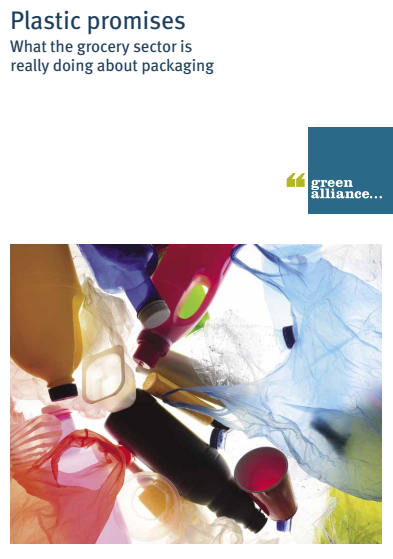Plastic alternatives may cause greater environmental harm, says new report
Amid rising public concern over the impact of plastic pollution, companies are facing increased pressure to swap to alternative materials, which often come with greater environmental consequences, according to a new report from think tank Green Alliance.
The report, entitled ‘Plastic promises: what the grocery sector is really doing about packaging’, has been put together for Green Alliance’s Circular Economy Task Force, a business forum whose members include Viridor, SUEZ recycling and recovery UK and Veolia.

Featuring anonymised interviews from the UK’s leading supermarkets and brands, the report indicates that very little has changed since Blue Planet II hurled the environmental consequences of plastic pollution into the public spotlight in 2017. Although companies are under scrutiny to shift away from plastic, UK supermarkets are still selling nearly 900 pieces of single-use plastic packaging for every person living in the UK each year.
According to the research, supermarkets are receiving more and more complaints from the public about the use of plastic, with one supermarket representative saying: “It’s been ferocious. We’ve seen an 800 per cent uplift in customer queries in the last year alone.”
Alternative materials
With up to 700,000 plastic bottles littered each day, the growing public antagonism towards single-use plastic is well justified – but alternative materials may not necessarily be better for the environment, with shifts to new materials being made without consideration for their environmental impact nor whether there is adequate collection and treatment infrastructure in place for them.
According to the report, many businesses are beginning to make changes to put the public at ease, admitting that these decisions are sometimes made without fully evaluating the environmental consequences. One representative commented: “We are aware that [by switching from plastic to other materials] we may, in some cases, be increasing our carbon footprint.”
Notably, several UK supermarkets, including Morrisons, Tesco and Sainsbury’s, have switched from single-use plastic bags to single-use paper bags for loose produce and bakery items. Although this may seem like a step forward in reducing unnecessary plastic waste, paper alternatives can have much higher carbon impacts – a recent Danish study found that a paper bag would need to be reused 43 times to have a lower impact than the average plastic bag.
A previous report from Green Alliance, published in August, also warned of the dangers of single-use plastic alternatives, pointing out that all materials have environmental impacts – glass, for example, produces considerably higher carbon emissions than plastic or aluminium.
Dan Cooke, Head of Sustainability at Viridor, said: “The often kneejerk reactions of some buyers and brands can cause frustration for recycling companies as they move away from inherently recyclable packaging types into materials like coated cardboard and composites that are less recyclable and that can have a worse environmental impact.
“We work closely with supermarkets and brand owners on recyclability and to align recycling services with their requirements. There’s still an obvious need for improved collaboration and better policy to enable investments in technology and infrastructure that will sustainably raise recycling rates for post-consumer materials.”
Biodegradable packaging
Green Alliance’s new report also highlighted concern around compostable or ‘biodegradable’ packaging, as over 80 per cent of consumers think that these options are the most environmentally-friendly, with little understanding of what the terms actually mean.
Calling for a clearer approach towards biodegradable and compostable packaging, one business representative said: “We need to work together as a waste value chain to decide what we do with compostable packaging, where we should use it and how we should mark it so that it can be identified readily.”
Adam Read, external affairs director at SUEZ recycling and recovery UK, said: “If we aren’t careful, short-term decisions could cause longer term problems for establishing a true circular economy. As the war on plastics continues to rage, avoiding unintended consequences should be at the forefront of everyone’s minds, and that includes government, industry and, of course, consumers. Change must be managed and planned if we’re to move towards fully closed-loop systems for recycling and, more importantly, reuse.
“That means we need to think much more carefully (and quickly) about how materials like compostable plastic are introduced. We must ensure a system where they are used where they make sense and in a way that people will understand to limit contamination and leakage.”
As retailers struggle to develop a sustainable solution to the plastics issue, increased intervention from the government will be crucial in addressing the legacy of our throwaway culture by developing a joined-up, coherent response. One supermarket representative commented: “If I could have a magic wand, I’d like to see more joined-up, top-down government intervention. We would like to see the government be braver.”
Libby Peake, senior policy adviser on resources at Green Alliance, commented: “The public are right to be outraged about plastic pollution. But what we don’t want is, a few years down the line, for them to be outraged about new environmental problems caused by the alternatives. We need to address the root of the problem, our throwaway society.
“Companies need much more help from the government to tackle plastic pollution without making climate change and other environmental impacts worse in the process.”
Richard Kirkman, Veolia UK’s Chief Technology and Innovation Officer, added: “This report is a reality check – it shows what’s happening with plastics on the ground and why we need to keep a level head. Let’s follow the science and ensure producers and consumers make sound material choices in line with the progressive resources and waste strategy.”
System ‘not fit for purpose’
However, the findings of Green Alliance’s report have not been unanimously accepted, with Sian Sutherland, Co-founder of campaign group A Plastic Planet, highlighting that the damaging impacts of plastic pollution should not be understated. Sutherland said: “It’s no surprise that a report commissioned by a body made up of some of the world’s biggest recycling companies backs the status quo.
“Instead of complaining that they do not have the infrastructure in place to deal with alternatives and using skewed measurements to defend inaction, they need to work with producers and government to radically overhaul a system that is not fit for purpose.
“Plastic is devastating to our environment and everything that lives in it. I’ve never seen media coverage of a whale beached and dying with a belly full of paper bags.”
Government action
The government has made tackling plastic pollution a key part of its environment policy. The 25 Year Environment Plan pledged to eradicate ‘avoidable’ plastic waste by 2042, and the Resources and Waste Strategy has promised to make packaging producers cover the full costs of recycling their products, introduce a deposit return scheme (DRS) for disposable drinks containers and to introduce a tax on plastic packaging that uses less than 30 per cent recycled content.
Having completed the first round of consultations on the aforementioned policies in July last year, industry awaits the release of the second raft of consultations, though environment policy remains in suspended animation following the general election, which saw the Environment Bill fail to pass through Parliament before the election campaign.
Despite the election causing further delay in enacting long-awaited reforms to environmental policy, it did bring one major new piece of policy, with the Conservatives’ promising to end the export of plastic waste to non-OECD (Organisation for Economic Cooperation and Development) countries.
A ban on wash-off plastic microbeads used in cosmetic and personal care products also came into force at the start of 2018, while a ban on plastic straws, drinks stirrers and plastic-stemmed cotton buds will come into effect in England later this year.
You can read the report in full on the Green Alliance website. 










